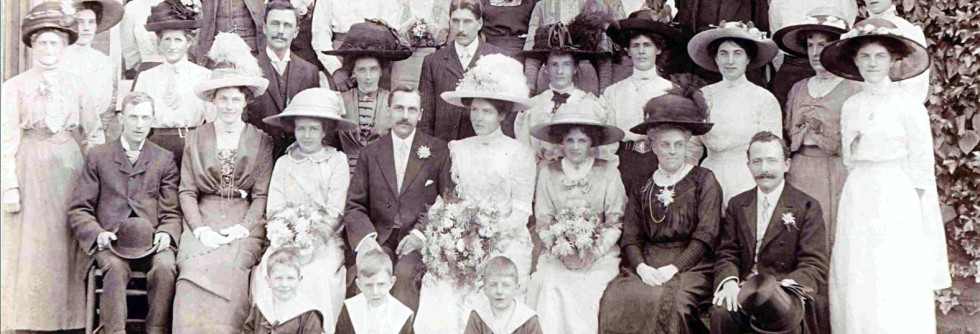There are many men in my family tree named Benjamin Clarke. The one I’m writing about now is my great-uncle Benjamin, born 25 July 1879 in Palgrave, Suffolk. He was the youngest brother of my paternal grandfather, Hugh James Clarke, who I have written about previously.
When I began researching my family history, I was told that Benjamin had lost a leg in the Boer War. As with many family stories, this one had some truth to it, but was not entirely accurate. Benjamin did serve in the Boer War, and he did lose a leg, but not in the Boer War.

Benjamin joined the Grenadier Guards on 27 August 1898, when he was 19 years old. He spent a month in Gibraltar in 1899, and then saw action in South Africa at the battles of Belmont and the Modder River. He returned to England in July 1900, with all limbs intact.
In 1906, Benjamin married Harriet Griffith, and the couple started a family. In 1914, Benjamin and Harriet were living in Cardiff, Wales, where Benjamin was employed as an electric tram driver.
The hostilities that triggered WWI began in July 1914, and Britain declared war on Germany on 4 August 1914. Less than a month into the war, on 30 August 1914, Benjamin re-enlisted. He was 35 years old at the time.
Benjamin was sent to France with the Grenadier Guards in November 1914, and was wounded at Neuve Chapelle in March 1915. About two weeks after being injured, Benjamin had his left leg amputated. He was discharged as medically unfit for service.
Benjamin returned to work for the tram company in Cardiff, as depot inspector for the Cardiff City Tramways Department. In 1928, Benjamin suffered an appendicitis. Penicillin was not discovered until the following year, and in spite of surgery, Benjamin developed general peritonitis. He survived two wars and the amputation of a leg, but he unfortunately did not survive the peritoneal infection. He died 21 October 1928, at age 49, at the Royal Infirmary in Cardiff.
The Diss Express of 2 November 1928 reported that Benjamin’s funeral was a military one, attended by more than 200 of his fellow tramway workers. He was carried to his final resting place in the Cardiff Cemetery by a gun carriage laden with wreaths, preceded by the Cardiff City Tramways Band. A fitting tribute for a man who had served his country in two wars.
Sources:
- General Register Office of England and Wales. Certified Copy of an Entry of Death. Cardiff, Wales. 21 October 1928. Clarke, Benjamin. Copy dated 3 April 2004.
- Grenadier Guards Regimental Archives. London, England. Short Service Attestation. Mansfield, Nottinghamshire. 27 August 1898. Clarke, Benjamin. Service No. 7614.
- General Register Office of England and Wales. Certified Copy of an Entry of Marriage. Chelsea, London. 26 April 1906. Clarke, Benjamin and Griffiths, Harriet. Copy dated 4 April 2004.
- Grenadier Guards Regimental Archives. London, England. Army Reserve One Year’s Service Attestation. Cardiff, Wales. 30 August 1914. Clarke, Benjamin. Service No. 17823.
- Diss Express (Norfolk, England). (1928). Military Funeral of an “Old Contemptible” and South African War Veteran. Diss Express. 2 November. p.5c. Collection: British Newspapers 1710-1953. http://www.findmypast.com/ : accessed 28 March 2016.

